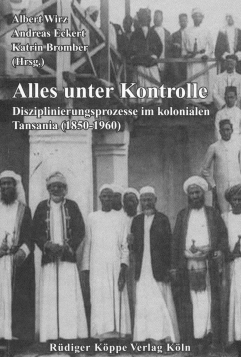


The majority of papers collected in this volume originated in the context of the special research program Transformations of European Expansion from the 15th to 20th century. Studies on the cognitive interaction between European and non-European societies, supported by the German Research Foundation (DFG).
The authors argue that to blame the apparent crisis of power of central governments throughout much of Africa on the effects of progressing globalization, as is commonly attributed, is misguiding. They can perceive no apparent end to the existence of territoral bureaucratic states, but rather the beginnings of a change in the societies away from the left-overs of conventional colonial and post-colonial power structures.
The authors follow some specific examples drawn from the colonial history of Tanzania, where the interaction between the endeavours of the colonial administration to discipline its subjects, and the reactions and evasive strategies employed by said colonial subjects sheds new light on the present situation. It becomes clear that the absorption of African societies into the colonial power structure was never unilateral but instead a complex mixture of very different forces. It also offers an explanation why, even at the end of colonial rule in Tanzania, the declared aim of a rationally ordered, bureaucratic government mirroring conditions in Europe was far from achieved.
One of the main reasons for the brittleness of this colonial aspiration and its unreality can be found in the everyday actions of representatives of the colonial administration, which were often more guided by violence and lack of discipline than by the tenets preached to the colonial subjects. A central role in the said disciplinary processes were played by notions of time, space and the body held by administrators and subjects, which were given special attention within the scope of education and the military. Here the procurement of a body of loyal administrative assistants was attempted, without whom the enforcement and working of colonial power was impossible.
Yet it remains questionable if these assistants really were touched by their new behavioural norms or aquired knowledge and spread them in their function as cultural brokers. Other elements of their everyday life, be they the norms of local tradition or the experience of European arbitrariness and lack of discipline, often proved the stronger influence. And from this indigenous administrative elite sprung the bearers of anti-colonial nationalism and the early independent national state, who reflected in their own use of power only too often the negative patterns of behaviour described above.
CONTENTS
Einleitung
Albert Wirz:
Körper, Raum und Zeit der Herrschaft
Zeitenwechsel
Katrin Bromber:
Disziplinierung – eine europäische Erfindung? Das islamische Bildungswesen an der ostafrikanischen Küste des späten 19. Jahrhunderts
Katrin Bromber / Jürgen Becher:
Abdallah bin Hemedi – Ein Vertreter der administrativen Elite im Transformationsprozess zwischen Busaidi-Herrschaft und deutscher Kolonialadministration
Neue Kleider
Katrin Bromber:
Ein Lied auf die hohen Herren – Die deutsche Kolonialherrschaft in der historiographischen Swahiliverskunst der Jahrhundertwende
Michael Pesek:
Islam und Politik in Deutsch-Ostafrika
Jürgen Becher:
Die deutsche evangelische Mission als Erziehungs- und Disziplinierungsinstanz in Deutsch-Ostafrika
Jürgen Becher:
Martin Ganyisha – Eine afrikanische Missionskarriere
Eigene Wege
Andreas Eckert:
„Disziplin und Tränen“ – Erziehung, Verwaltung und koloniale Ordnung in British-Tanganyika
Katrin Bromber / Andreas Eckert:
A People’s Princess? Der Besuch von Prinzessin Margaret in Tanganyika, Oktober 1956
Andreas Eckert:
Patrick Kunambi – Politiker und Chief in der Dekolonisationsperiode
Reinhard Klein-Arendt in Afrikanistik online, www.afrikanistik-online.de/archiv/2006/616, 1-4
© 2026 by Rüdiger Köppe Verlag – www.koeppe.de